
Macular Degeneration
Understanding the Condition and Managing Vision Loss
Macular degeneration, also known as age-related macular degeneration (AMD), is a progressive eye condition that affects the central part of the retina called the macula.
WHAT IS MACULAR DEGENERATION?
Macular degeneration is a leading cause of vision loss, particularly in older adults. It affects the macula, which is responsible for sharp, central vision needed for tasks such as reading, driving, and recognizing faces. AMD generally occurs in two forms:
Dry Macular Degeneration: Accounts for 85-90% of cases, is characterized by the gradual breakdown of light-sensitive cells in the macula and progression is generally slower than in wet AMD.
Wet Macular Degeneration: Accounts for 10-15% of cases, is characterized by the growth of abnormal blood vessels beneath the macula, which can leak blood and fluid, causing rapid and severe vision loss.
RISK FACTORS
Risk Factors - While the exact cause of macular degeneration is unknown, several risk factors have been identified:
Age: The risk increases with age, particularly after the age of 60.
Family History: Having a family history of AMD increases the likelihood of developing the condition.
Smoking: Smoking cigarettes significantly increases the risk of macular degeneration.
Race and Ethnicity: AMD is more common in Caucasians, but it can affect people of all races.
SYMPTOMS
Blurred or distorted central vision
Difficulty recognizing faces or reading small print
Dark or empty areas in the central vision
Reduced brightness or intensity of colors
Straight lines appearing wavy or crooked
MANAGEMENT AND TREATMENT
While there is no cure for macular degeneration, several management strategies can help slow its progression and optimize remaining vision:
Regular Eye Exams: Routine eye exams can detect early signs of macular degeneration and guide appropriate management.
Lifestyle Modifications:
Quit smoking: Smoking cessation can reduce the risk and slow the progression of AMD.
Healthy diet: Consuming a diet rich in green leafy vegetables, fruits, fish, and omega-3 fatty acids may be beneficial.
Exercise regularly: Engaging in regular physical activity promotes overall health, which can positively impact eye health.
Maintain a healthy weight and manage chronic conditions such as hypertension and diabetes.
Low Vision Aids: Utilize low vision aids such as magnifiers, telescopic lenses, and task-specific lighting to optimize remaining vision.
Anti-VEGF Therapy: For individuals with wet AMD, injections of anti-VEGF medications can help slow the growth of abnormal blood vessels and preserve vision.
Support and Rehabilitation: Seek support from vision rehabilitation services, which can provide guidance on adaptive techniques, assistive devices, and emotional support.




